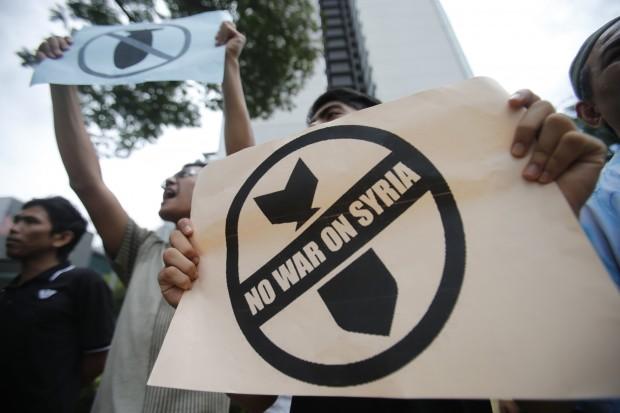U.S. officials press case as Russia floats plan for ‘international control’ of Syrian chemical weapons
Demonstrators display placards during a protest against possible U.S. attacks on Syria, outside the U.S. Embassy in Kuala Lumpur, Malaysia on Sept. 6, 2013. (Photo by Bazuki Muhammad/Reuters.)
President Barack Obama pressed his case for military intervention in Syria Friday in St. Petersburg, Russia, after attending last week’s G-20 summit.
On Monday, his administration was upping the pressure in advance of his Tuesday address to the nation. U.S. Ambassador to the United Nations Susan Rice said that it was important to U.S. national security for Syria to be punished for it’s use of chemical weapons. Failing to respond, she said, brings us closer to the day when terrorists would gain and use chemical weapons on the United States. In addition, the White House announced that 14 more countries, now totaling 25, had signed onto the U.S. statement calling for Syria.
“I would greatly prefer working through multilateral channels and through the United Nations to get this done,” Obama said during a Friday news conference dominated by the topic of possible U.S.-led strikes in Syria. However, “when there’s a breach this brazen of a norm this important and the international community is paralyzed and frozen, and doesn’t act, then that norm begins to unravel. And if that norm unravels then other norms and prohibitions start unraveling, and that makes for a more dangerous world.”
Obama did not succeed in winning over Russian President Vladimir Putin on the idea of punitive strikes against the Syrian government of Bashar al-Assad. On Monday, Russia offered its own plan, that Syria’s chemical weapons be place under “international control” — a proposal that Syria indicated would be acceptable without providing any additional details.
In a briefing at the State Department, a spokesperson said the U.S. would take a “hard look” at the proposal, while insisting it was important to “keep the pressure up.
Congress seems no closer to a decision about backing Obama, with Obama still far short of a majority in either house.
“I knew this was going to be a heavy lift,” Obama said Friday.
He expressed no regrets for deciding to seek Congressional authorization for the use of force. But he characterized the Syrian government’s alleged use of chemical weapons against civilians — including hundreds of children — as a grave threat to world peace and security.
“This is not something that we’ve fabricated. This is not something that we are using as an excuse for military action,” Obama said. “I was elected to end wars, not start them.”
Ambassador Frederic Hof, the Obama administration’s former point man for Syria, thinks the administration made a mistake by waiting so long to start developing a clear strategy for Syria. But in recent weeks, Hof says he finally sees a strategy coming together.
The ambassador called this a “perilous moment” for U.S. policy in Syria.
Every day, reporters and producers at The World are hard at work bringing you human-centered news from across the globe. But we can’t do it without you. We need your support to ensure we can continue this work for another year.
Make a gift today, and you’ll help us unlock a matching gift of $67,000!
